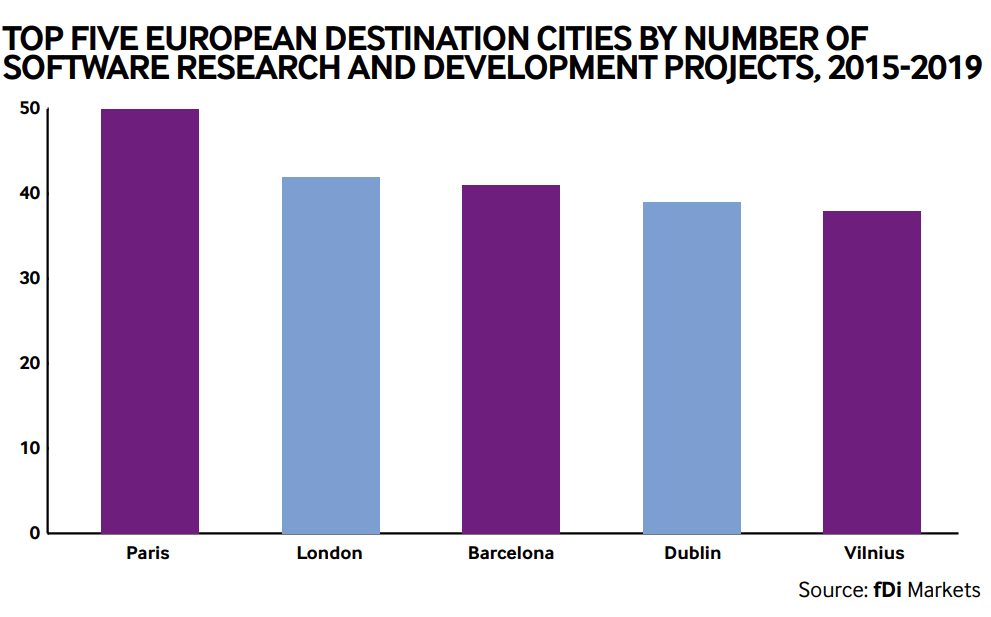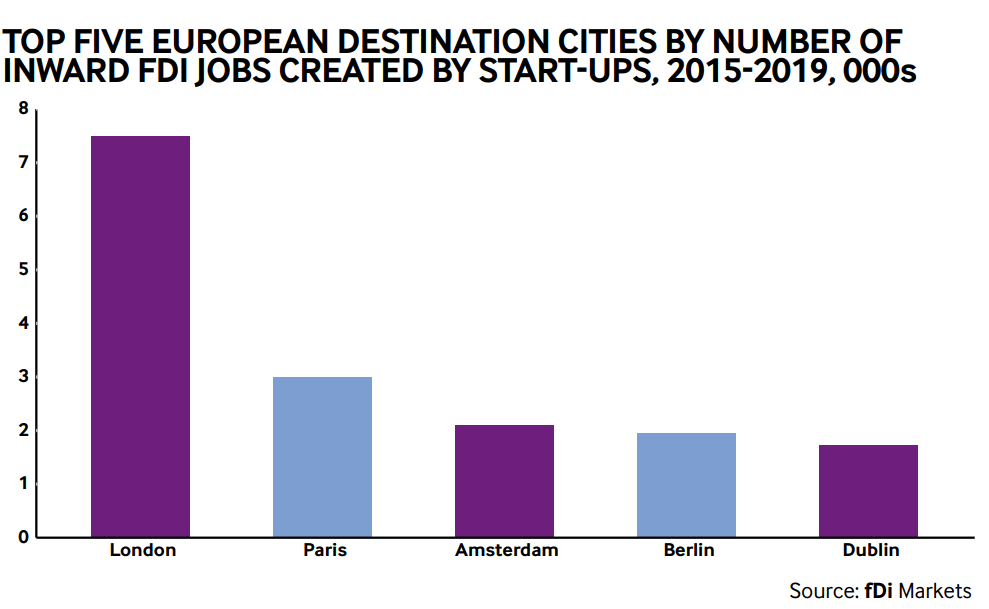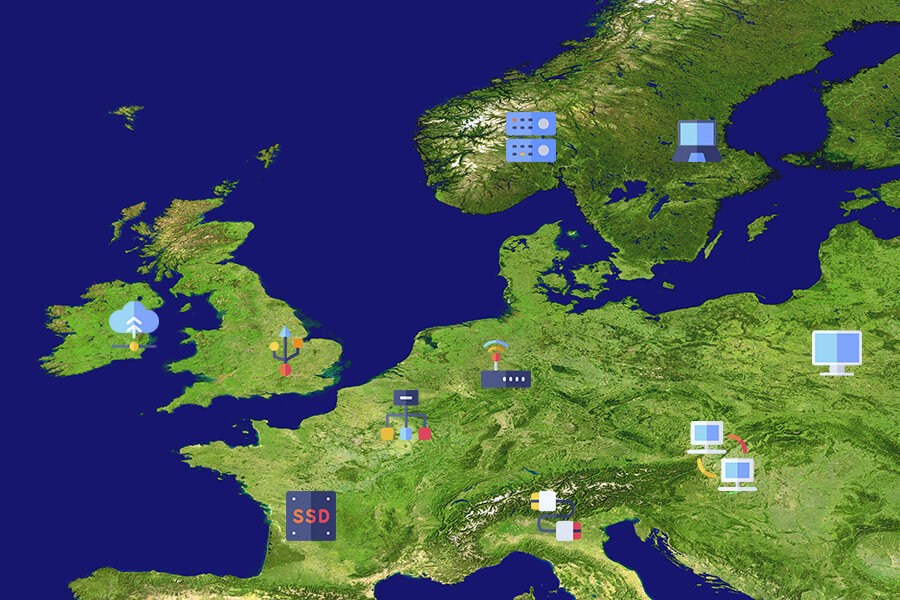London, Paris, and Dublin have the most promising prospects for start-ups, tech and innovation investment, according to a report from technology and start-up news publication The Next Web and FDI Intelligence, which is part of the Financial Times.
The report, entitled Tech Cities of the Future 2020/21, looked at different aspects of cities that might attract innovative businesses and start-up leaders, ranking cities in a number of categories: Innovation and Attractiveness, Economic Potential, FDI (foreign direct investment) Performance, Start-Up Environment, and Cost-Effectiveness.
Let’s have a closer look at the cities that have taken the first five places in the overall ranks.
1. London
London has taken first place in five out of six categories, except Cost-Effectiveness (which is understandable as it is one of the most expensive cities in the world).
The UK capital continues to be a global innovation hub, with more than 5,000 patents in software and more than 100 in artificial intelligence registered in the city between 2003 and 2019. London also has a reputation as a talent hub hosting 370,000 students and five of the world’s top 500 universities in electric and electronic engineering.
Between 2015 and 2019, FDI in the software and IT services and communications sectors made up about 50% of London’s total inward FDI. In 2019, tech investors in the city ranged from large multinationals such as Huawei Technologies, Facebook, and Robert Bosch to smaller start-ups such as Chainalysis and Lilium Aviation.
The city boasts more than 70,000 companies in the software and IT services, 5,000 in communications, and almost 4,000 in research and development (R&D), according to figures from Dun & Bradstreet.
According to data compiled by London & Partners, the UK capital is producing more unicorn tech companies (firms valued at more than $1 billion) than any other European city. These companies include Deliveroo, Farfetch, Monzo, and Revolut.
Besides, between 2015 and 2019, London attracted the highest amount of jobs from start-up companies out of all 76 locations studied.
2. Paris
Paris ranks as the second tech city of the future, taking the second place (after London) in the Innovation and Attractiveness category. And it is hardly surprising as the French capital has 10 of the world’s top 500 universities in computer science and engineering.

The French capital city also ranks high in terms of FDI performance: Paris attracted 50 inward FDI projects in software R&D between 2015 and 2019 — the highest out of all cities analyzed. Investors include Inex One, a Swedish provider of a software as a service procurement tool, and an online food delivery app iFood.
In addition, Paris did well in the Economic Potential category — since investors can start a business there in just four days.
3. Dublin
Dublin, the capital of the Republic of Ireland, places third in the study. This city ranked second in the Economic Potential category, with Ireland excelling in various country-level data points, including the 2020 Index of Economic Freedom.
Dublin also shone in the FDI Performance category, with the highest level of capital investment in software R&D out of all locations analyzed.
4. Amsterdam
Amsterdam is the fourth city in terms of FDI performance, behind London, Dublin, and Paris. It is also the seventh city in terms of economic potential, and one of the top European cities by the number of inward FDI jobs created by start-ups between 2015 and 2019 — 2,000+, more than in Berlin and Dublin.

The Dutch government has worked hard to negotiate favorable trade deals with nations across the globe to make Amsterdam attractive to operate in. For instance, StartupAmsterdam, a result of a collaboration between the City of Amsterdam and the private sector, is a start-up and scaleup-focused initiative designed to help companies grow in a suitable environment. Several international tech companies including Netflix, Tesla, and Uber have chosen Amsterdam as their European HQ.
5. Berlin
Berlin, the capital of Germany, places fifth in the study. The city has grown as one of the most innovative and attractive locations for start-ups and tech companies thanks to many initiatives. One of them, launched by Berlin’s business development agency, has created an ecosystem that boasts over 9,500 start-ups, accounting for 15.8% of Germany’s total.
In addition, the city’s “Gründen in Berlin” platform provides information for entrepreneurs, and StarterCenter provides advice and mentorship. Berlin also boasts specialized entrepreneurial centers, such as the Factory for Internet of Things (IoT) start-ups and fintech-focused H:32-Tower.
20 more top tech cities
Here’s the rest of the top tech cities of the future according to the overall ranking:
6. Munich (Germany)
7. Bucharest (Romania)
8. Barcelona (Spain)
9. Belfast (UK)
10. Cambridge (UK)
11. Madrid (Spain)
12. Stockholm (Sweden)
13. Frankfurt am Main (Germany)
14. Zurich (Switzerland)
15. Warsaw (Poland)
16. Edinburgh (UK)
17. Reading (UK)
18. Moscow (Russia)
19. Helsinki (Finland)
20. Sofia (Bulgaria)
21. Milan (Italy)
22. Prague (Czech Republic)
23. Tallinn (Estonia)
24. Krakow (Poland)
25. Glasgow (UK)
